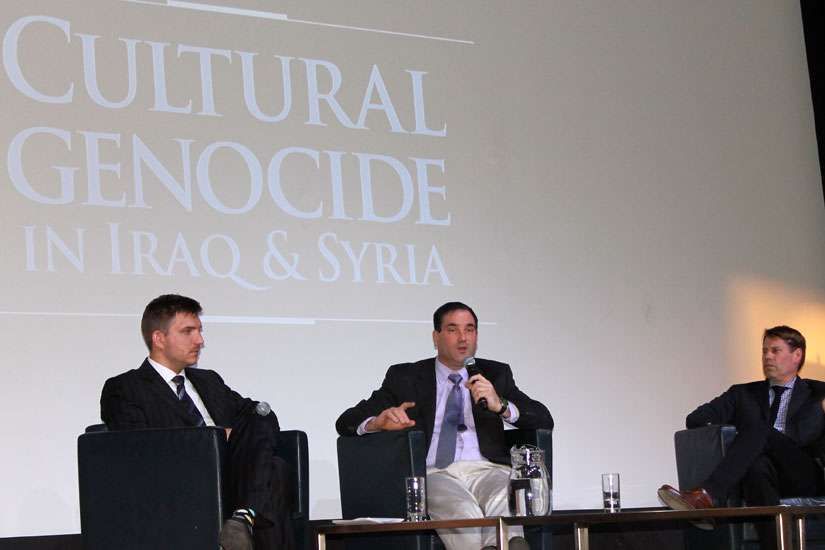The Islamic State’s desire for an Islamic caliphate in the Mideast includes the extermination of cultural heritage as it destroys antiquities in Iraq and Syria that don’t correspond with its ideals, said Priewe, managing director of three of the Royal Ontario Museum’s Centres of Discovery.
“The continued existence of these beacons of civilization have no use in the Islamic State (so) they loot and sell antiquities to finance their war chest,” Priewe told an audience of about 200 people at an April 14 panel discussion at the ROM in downtown Toronto.
The panel, featuring Priewe, ROM’s associate curator of Near Eastern Archeology Dr. Clemens Reichel and journalist Patrick Graham, examined the losses and significance of the destruction of cultural heritage by the Islamic State in the cradle of civilization.
To illustrate the reality taking place, a short video clip was aired showing members of the Islamic State knocking over ancient statues and artifacts and smashing them to pieces with sledgehammers. The clip was taken from a video made by the media-savvy organization.
“The Royal Ontario Museum condemns, in the strongest possible terms, the deliberate destruction of archeological sites and museum collections, as well as the systematic looting and sale of artifacts in northern Iraq by the Islamic State of Iraq and Syria/Lebanon,” read a statement issued by the ROM in a press release distributed to all in attendance.
“The Royal Ontario Museum is ready and committed to share its resources to help assess and limit the damage to archeological sites and monuments, and to stop the sale of looted artifacts from Iraq.”
Reichel, who is also an assistant professor of Mesopotamian Archeology at the University of Toronto, emphasized the ROM is not putting archeological heritage ahead of the human tragedy.
“We’re connecting it with the human tragedy.”
When you hear about the horrendous things that are happening to the people of Iraq and Syria — the refugee camps, the murders, the needless destruction of human lives — the archeology seems to pale in comparison, said Graham, who was based in Iraq during the start of the 2003 American-led invasion.
“The Christian and Islamic (buildings), they’re not just stones. They’re living buildings,” he said.
“What I got from living in Baghdad is that these places are more than even vessels of history. In my experience, they are an expression of reality. And those who dismiss them, in the end, dismiss reality as it is lived rather than the reality they’d like to see other people live.”
With the fall of Mosul in Iraq during the Islamic State’s lightning advance through Iraq and its defences, churches were immediately vandalized, said Reichel.
“What is amazing to most people who are not familiar with Iraqi tradition and history is the long tradition that Christianity has in Iraq,” he said, showing images of the destruction of the monastery in Mosul. The monastery dated back to the fourth century.
“The so-called Green Church in Tikrit was also destroyed in October,” he added. “It was reduced to a pile of rubble. It’s a great pity as it was one of the earliest Assyrian churches in Iraq.”
The destruction of the Shrine of Jonah was also a major shock, he said.
“It’s actually the site of an Assyrian palace that was built over by a… Christian church that later was incorporated into a mosque so it has a very long tradition. Last July, the interior was desecrated and then, in a gigantic explosion, the whole building was turned to rubble.”
There have been calls to buy the antiquities from the Islamic State in order to save those that remain, but all that is doing is funding the Islamic State.
“There is no controlled excavation there so you’re actually making the problem worse than it actually is (by purchasing),” said Reichel.
Graham drew a parallel between the Americans allowing the looting of the National Museum of Iraq during the U.S.-led invasion in 2003 and what the Islamic State is doing now “to dismiss a reality in favour of an idea.”
“The promise of a future that has no past. For the Americans, the invasion promised a kind of year zero democracy… This is not dissimilar to the cultural reinvention currently being undertaken by ISIS. In both cases, there is a contempt for history.”
(Santilli is a freelance writer in Toronto.)


